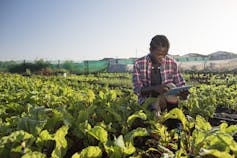COP28’s commitment to transforming farming and food systems is an insult to Africans
Globally, food systems are unsustainable: 80% of the production of food is powered by fossil fuels. The food system is responsible for over one-third of global greenhouse gas emissions. It is the primary driver of biodiversity loss. The COP28 climate change conference has issued a declaration on sustainable agriculture and resilient food systems. An expert on food systems, Florian Kroll, sets out why the COP28 commitments are inadequate.
What was your assessment of what’s needed?
The African Food Systems Transformation Collective launched a declaration on the commitments that government leaders at COP28 needed to make to transform African food systems. The collective is a network of over 200 leading African academics and civil society representatives.
The collective wants world leaders to protect traditional food and seed systems. It has urged global leaders to respect custodianship of nature and shared food as expressions of sacred African values of interdependence and care.
Research and learning must be informed by the wisdom of nature and indigenous knowledge. Locally led technological innovations can level the playing field and improve resource efficiency. These include enhanced traditional storage and processing and renewable energies.
Yet food systems transformations must also go beyond techno-fixes. They must make sure that everyone has fair access to good food.
Supporting people’s agency – their ability to govern food systems – is central to transformation. Women, youth, children, elders and small food enterprises must be able to participate in planning and decision-making. Governance must prevent land-grabbing and promote land reform to right current and historical injustices. Water resources must be managed democratically, to protect and regenerate catchments, coastlines and oceans. Everyone should enjoy equitable access to safe water.
The collective believes food systems must be nourishing, biodiverse, carbon-negative, resilient and fair. States and philanthropies should spur locally led adaptation.
The call was for COP28 leaders to commit to separating food systems from the fossil fuels, antibiotics, preservatives, pesticides, herbicides and artificial fertilisers they are currently centred on. Governments should instead promote local food production with short value chains and strengthen fair trade between African countries. This would mean a big change in regulations, and investment in new infrastructure and technology. Small and informal food enterprises should also be supported with climate-resilient infrastructure.

Governments were urged to develop incentives and other forms of financial assistance to support this food systems transformation. And to make sure that high-emitting developed nations channel far more funds to developing countries through the loss and damage fund. These funds should compensate developing country stakeholders highly affected by climate change.
How the COP28 declaration fails
There is no commitment to de-carbonise food systems, divest from fossil fuel industries or transition to renewable energies. Measures to curb monopolies are not mentioned. COP28 talks about “more sustainable” food systems. Protecting biodiversity and reducing greenhouse emissions looks good at first glance. But unless the entire system of food production is changed, it will make little difference. Most African greenhouse gas emissions linked to food provision are caused by deforestation and on-farm emissions. Even if food is produced using more sustainable approaches, expanding conventional agriculture will accelerate environmental destruction and greenhouse gas emissions.
There’s also a problem for African countries in the recommendations on more sustainable production and consumption. This includes, for example, moving from food production that requires high green gas emissions. But, for African countries, the most pressing issue is in fact nutritional deficiencies.
The COP28 declaration avoids tackling the structural problems underpinning the food systems crisis. These include powerful fossil fuel, fertiliser and seed industry lobbies, ordinary people’s lack of access to land and resources, widespread inequality, and poverty and unemployment.
The COP28 declaration does not acknowledge the benefits the global north has derived from development that was driven by fossil fuels. Nor does it recognise that the global south will bear the brunt of climate change harm. It side-steps climate justice demands for reparations.
The COP28 statement is committed to public-private partnerships and the global World Trade Organisation regime. This is especially problematic. The World Trade Organisation is at the heart of the current neoliberal food regime. It pushes developing countries to extract finite mineral resources and grow export crops for global trade. Cheap imports undermine local industry and livelihoods.
Public-private partnerships allow corporations to influence government policy to their benefit, at the expense of local industries, the poor and the unemployed. Commitment to “support vulnerable people” while protecting public-private partnerships and World Trade Organisation influence entrenches the global food regime.
What’s at stake
Given the risk, scale and pace of climate change, ecosystem degradation and nutritional transition, the COP28 declaration dismally fails Africa. Climate change will affect Africa more than other continents, with large increases in the average annual temperature and the number of high-temperature days.
Reduced rainfall, shifting rainfall patterns, flooding and extended droughts will happen more and more. All food systems activities rely on water. Yet, by 2030, it is unlikely that four out of five African countries will have sustainably managed water resources.
This will have a severe impact on African ways of providing food. Africa already experiences serious food insecurity and malnutrition. Urban populations in Africa will triple between 2015 and 2050, reaching approximately 1.34 billion people who will be vulnerable to food supply disruption. Cities generate a demand for unhealthy food that is produced in environmentally destructive ways. Yet they could also drive transitions to sustainable and fair food systems.
African food systems urgently require decisive action to enable transformation. Inaction represents a massive risk to ecosystem health and to people’s wellbeing in Africa. The COP28 declaration represents a cynical attempt to disguise the patriarchal climate regime’s last-ditch defence of the current catastrophic food systems trajectory.








